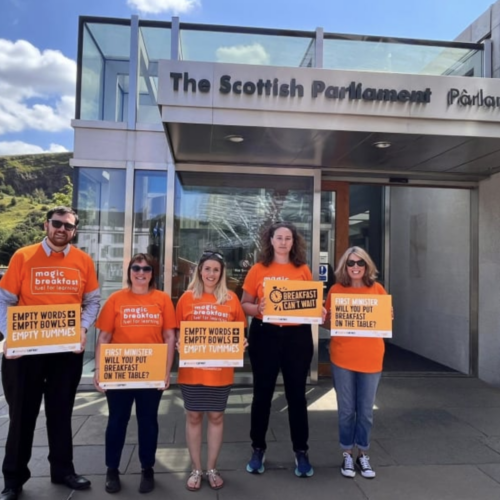Conference season is in full swing! We are sharing some reflections and highlights from the Labour Party conference in Liverpool last week.
The amount of people who visited Magic Breakfast’s exhibition stand, in partnership with Heinz, reflected the great enthusiasm for Labour’s school breakfast commitment – and our Breakfast Powers Opportunity campaign throughout the party; from the grassroots, upwards to the parliamentary party and the frontbench.
In particular, we were so heartened to have over 100 Labour MPs, MPs’ researchers and Councillors, and 100s more delegates, Labour activists and stakeholder representatives, visit our stand to learn about our campaign asks, pledge their support and arrange further meetings and visits to Magic Breakfast partner schools in their area.


With funding set aside to begin running free breakfast clubs in up to 750 primary schools with primary aged pupils next year ahead of a national rollout that will follow. This is about investing in education so we can invest in our economy too”.
Rachel Reeves, Chancellor of the Exchequer, Speech to 2024 Labour Conference
Magic Breakfast was delighted that both the Chancellor and the Education Secretary reaffirmed Labour’s commitment to universal primary school breakfast clubs in their speeches from their annual conference podium. They also made the new announcement of a £7m pilot programme for 750 breakfast club early adopter schools starting in April next year.
On the Tuesday, we held a fringe meeting with the Education Policy Institute on “Breakfast for all: what does an effective school breakfast policy look like to tackle child poverty?” and were so grateful to be joined by the Early Education Minister, Stephen Morgan, who has School Breakfast policy in his portfolio.
Through hundreds of conversations at our stand, and by handing out our campaign and research publications to so many conference goers, we were able to highlight the major benefits of school breakfasts for attendance, attainment, health, well being and behaviour, supporting families with busy mornings, and economic return on investment. Our Youth Advisor, Sophie Balmer, also spoke so powerfully at our fringe about her lived experience of morning hunger and the impact of school breakfast provision.
However, in order to fully realise these benefits, we are calling on the Labour government to deliver our Breakfast Powers Opportunity policy asks to maximise the reach and very substantial benefits of school breakfast. Our Policy and Public Affairs Manager, Lorraine Kelly, had the opportunity to highlight these to the Minister and the audience at our fringe event:
1) Deliver breakfast using a mix of models, on top of breakfast clubs, to suit the school and the pupils – e.g. in the classroom, playground, grab and go, and nurture clubs;
2) Fully fund equipment costs and expert support staff who will make sure school breakfast reaches as many pupils as possible, particularly the most disadvantaged;
3) Cover all primary aged children through Labour’s commitment – e.g. SEND, specialist schools, Pupil Referral Units – not just primary schools;
4) Don’t forget about secondary schools, as morning hunger does not end at 11. The government must therefore continue to provide and then expand the secondary element of the last government’s National School Breakfast Programme.
Labour has pledged £315 million for its breakfast clubs commitment and will legislate for it through a Children’s Wellbeing Bill. Additionally, the Chancellor announced a £7m pilot programme for 750 schools to become early adopters of school breakfast clubs, starting in April next year, ahead of the national roll out.
Following the end of Labour Conference, we were concerned by media reports that Chancellor Rachel Reeves faces difficult decisions over Labour’s policy to scrap concessions in non-domiciled tax status, amid fears from the Treasury that such a move may not raise money to fund its school breakfast clubs commitment.
In this context, and in the run up to the government’s Autumn Statement on 30 October and the introduction of the Children’s Wellbeing Bill, we will continue to urge the government to fully fund its school breakfast club commitment and extend its reach to all primary aged pupils through delivery mixed models and expert staff, as set out in our Breakfast Powers Opportunity campaign.
As was set out at our fringe, and picked up by sector media, doing so will enable the government to reach the maximum possible number of pupils with the major benefits of breakfast, at minimal extra cost, thereby making a major contribution to Labour’s strategy to address child poverty, and deliver the key policy missions it has set itself.






